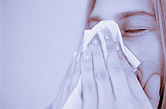|
1/17/2009's Health News
Last Seven Days' Health News 
|
HealthDay Reporter
MONDAY, Jan. 12 (HealthDay News) -- If you get less than seven hours of sleep a night, you're three times more likely to catch a cold. And if you sleep poorly, you're five times more susceptible to one as well.
Those are the findings of a new study, which its researchers said was the first to show that anything less than seven to eight hours of solid sleep can lower your resistance to the common cold virus.
"Regular sleep habits may play an important role in your immune system's ability to fight off infectious disease," said study lead author Sheldon Cohen, a psychology professor at Carnegie Mellon University in Pittsburgh. "Longer sleep duration and better sleep efficiency are both associated with greater resistance to the common cold."
Studies have shown that sleep deprivation impairs some immune function. And research also has found that people who sleep seven to eight hours a night have the lowest rates of heart disease and death.
For the new study, published in the Jan. 12 issue of Archives of Internal Medicine, Cohen's team collected data on 153 men and women from 2000 to 2004. The researchers ask the participants how many hours they slept a night and whether they felt rested. They also asked how much time the participants spent in bed sleeping.
The participants were then given nose drops containing a virus for the common cold. Five days later, they reported any signs and symptoms of a cold. The researchers also collected mucus samples to test for the virus. After 28 days, the researchers tested the participants' blood samples for antibodies to the virus.
The researchers found that those who slept less than seven hours a night were 2.94 times more likely to develop a cold.
"And those who lose more than 8 percent of sleep on an average night because they have trouble getting to sleep or wake up in the middle of the night are more than five times more likely to get a cold when exposed to a virus," Cohen said.
Dr. David L. Katz, director of the Yale University School of Medicine Prevention Research Center, said the study highlights the importance of sleep in maintaining good health.
"Getting good sleep should count among the priorities of health-conscious people," Katz said. "Time invested in sleep will almost certainly be paid back in dividends of better health -- fewer colds and greater productivity."
More information
For more on the common cold, visit the U.S. National Institute of Allergy and Infectious Diseases.
SOURCES: Sheldon Cohen, Ph.D., professor of psychology, Carnegie Mellon University, Pittsburgh; David L. Katz, M.D., M.P.H., director, Prevention Research Center, Yale University School of Medicine, New Haven, Conn.; Jan. 12, 2009, Archives of Internal MedicineCopyright © 2009 ScoutNews, LLC
 . All rights reserved.
. All rights reserved.HealthDayNews articles are derived from various sources and do not reflect federal policy.
omhrc.gov does not endorse opinions, products, or services that may appear in news stories.


